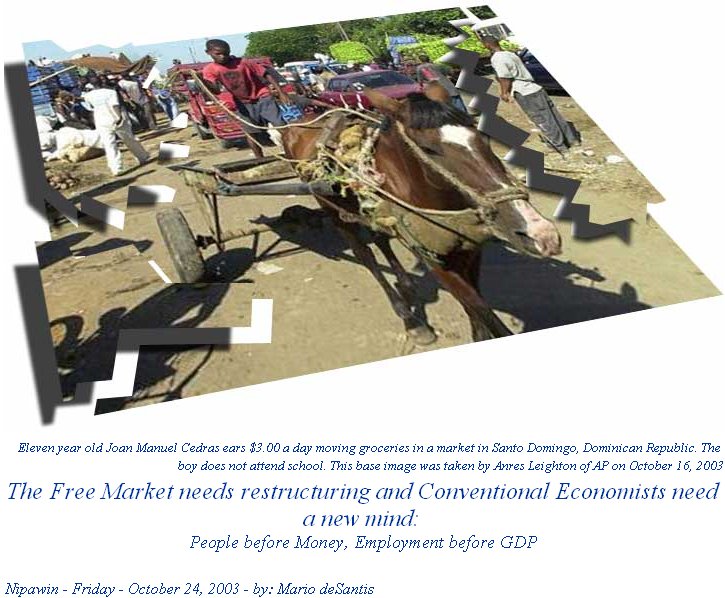Learning Stories
by
Mario deSantis
mariodesantis@hotmail.com
“I am a Canadian, free to speak without fear, free to worship in my own way, free to stand for what I think right, free to oppose what I believe wrong, and free to choose those who shall govern my country.” - -The Rt. Hon. John Diefenbaker, Canadian Bill of Rights, 1960
“The whole judicial system is at issue, it's worth more than one person.”--Serge Kujawa, Saskatchewan Crown Prosecutor, 1991
“The system is not more worth than one person's rights.”--Mario deSantis, 2002
Ensign Stories © Mario deSantis and Ensign
|
|
"Teach a parrot the terms supply and demand, and you've got an economist."--Thomas Carlyle, Scottish historian and writer, 1795-1881 "It is by invisible hands that we are bent and tortured worst."--Friedrich Nietzsche, German philosopher, 1844-1900 "If you think information is free then how come we pay a trillion dollars a decade to the CIA to find out more of it. Information is very expensive stuff and if the information is expensive then markets can not work freely and properly automatically, you have to regulate, you have to have government make sure that someone doesn't cheat the market."--Greg Palast, Investigative Journalist I cannot tolerate the wasted thought and hypocrisy of conventional economists. They write equations, maximise profit functions, and yet these conventional economists cannot admit that the economic structure has changed under the Free Market. The paradox of these conventional economists is that they use theoretical frameworks disassociated from reality. If we have a Free Market to satisfy the profit wishes of the banks and corporations how can we ever end poverty? The key economic word today should be "restructure" that is we need a new economic way to end poverty and have social growth. We must get away from focusing to an ever artificial growth of the Gross Domestic Product (GDP) along with the welfare of the banks and corporations; and instead we must focus on reaching full employment for willing people along with the welfare of their families. Full employment should be the most important economic indicator of any country. We have experienced a declining economic growth and increasing poverty levels since the International Monetary Fund (IMF) and the World Bank took over the rearrangement of the global economic system under the doctrine of the Free Market. Journalist Greg Palast writes:
It took three years for Nobel laureate Joseph Stiglitz to realise that the World Bank he worked for was ordering along with the IMF the wrong economic prescriptions for developing countries. The only relevant developing country which didn't regress in the last twenty years was China, and China didn't follow the advices of either the IMF or the World Bank. The United Nations Children's Fund (UNICEF) has just released a study concluding that global trade keeps a billion children in poverty, and in this regard Judith Melby, spokeswoman for the charity Christian Aid, has stated:
We have a Free Market commanded by the compassionate imperialistic power of the United States and yet Professor Dave Gordon, coauthor of the above mentioned UNICEF's study, has commented: "The Romans managed to provide sanitation for people thousands of years ago, and yet millions of people today still do not have access to a toilet." It is time for the restructuring of economics and it is time for a change of mind for conventional economists. The Bush administration wants China to appreciate the value of its currency, the Yuan, because the United States is experiencing over US$100 billion trade deficit with China. But the Chinese goods imported into the United States are mainly produced by foreign companies established in China. Also, imported Chinese goods are priced four or five times their Chinese cost and while they provide low cost goods to the American consumers they also contribute to a business capitalisation in excess of US$1 trillion. The Free Market has restructured the arrangement of production of goods and services in the United States as well as in the world and yet the American politicians of any stripe are blaming China for the loss of over 2.6 million manufacturing jobs in the last three years. In the meantime, these American politicians don't complain about the above mentioned capitalised business of US$1 trillion triggered by the Chinese imports. Does this kind of behaviour resemble Imperial Rome? We need to restructure the economic system to a system which puts people's lives before corporate's profits, and a first step is the recognition that full employment is more important than the Gross Domestic Product, in the United States and in the rest of the world. References Pertinent articles published in Ensign Palast, Greg IMF Confidential: The Secret Documents the Masters of the Universe Would Rather You Not See http://www.informationclearinghouse.info/article4977.htm Frith, Maxine Global trade keeps a billion children in poverty, says Unicef October 22, 2003 Independent Digital, http://news.independent.co.uk/world/politics/story.jsp?story=455868 Tyson, James Manufacturing groups want to file complaint against China on currency (PDF) October 22, 2003 Chicago Sun Times, http://www.suntimes.com/output/business/cst-fin-china22.html |
